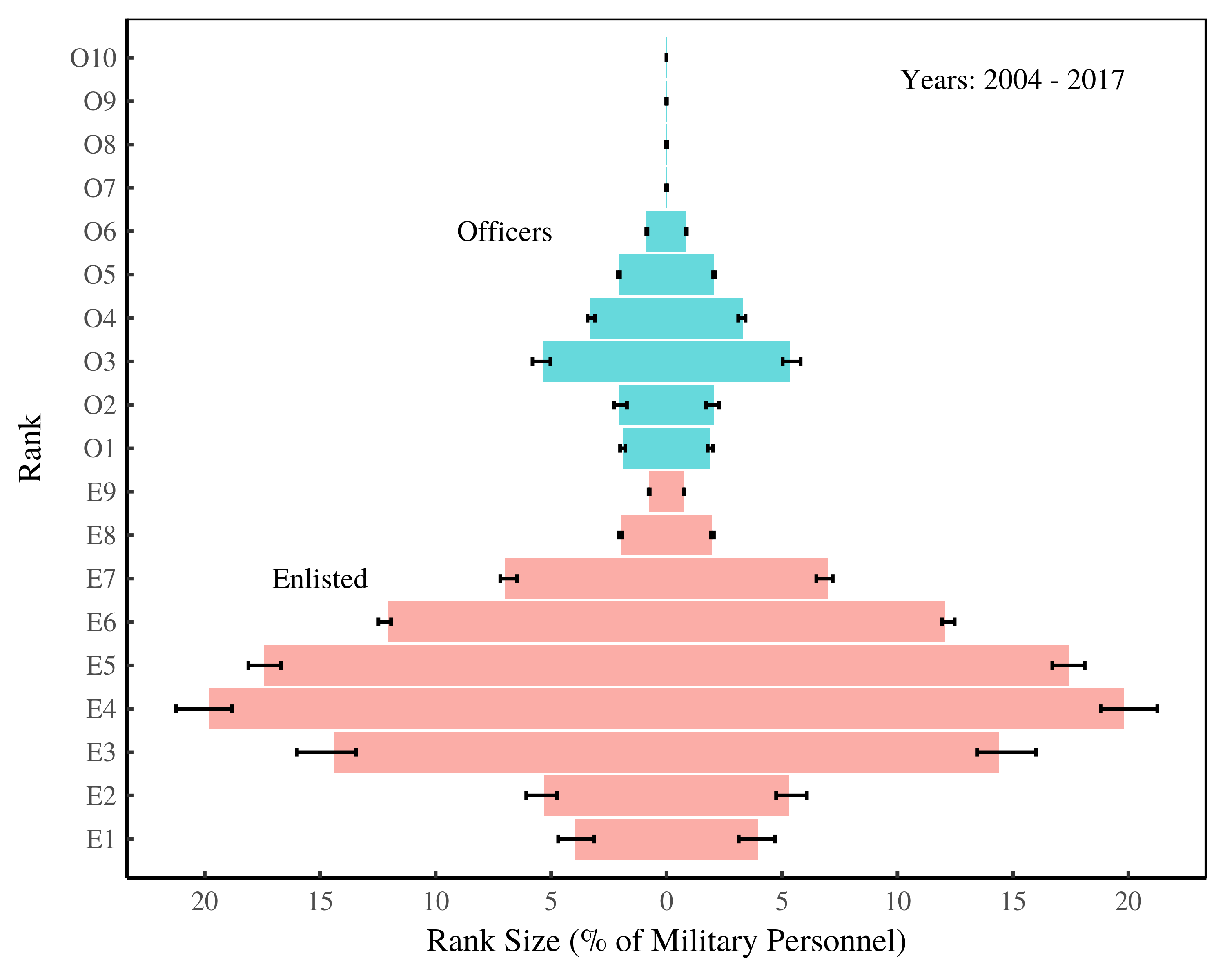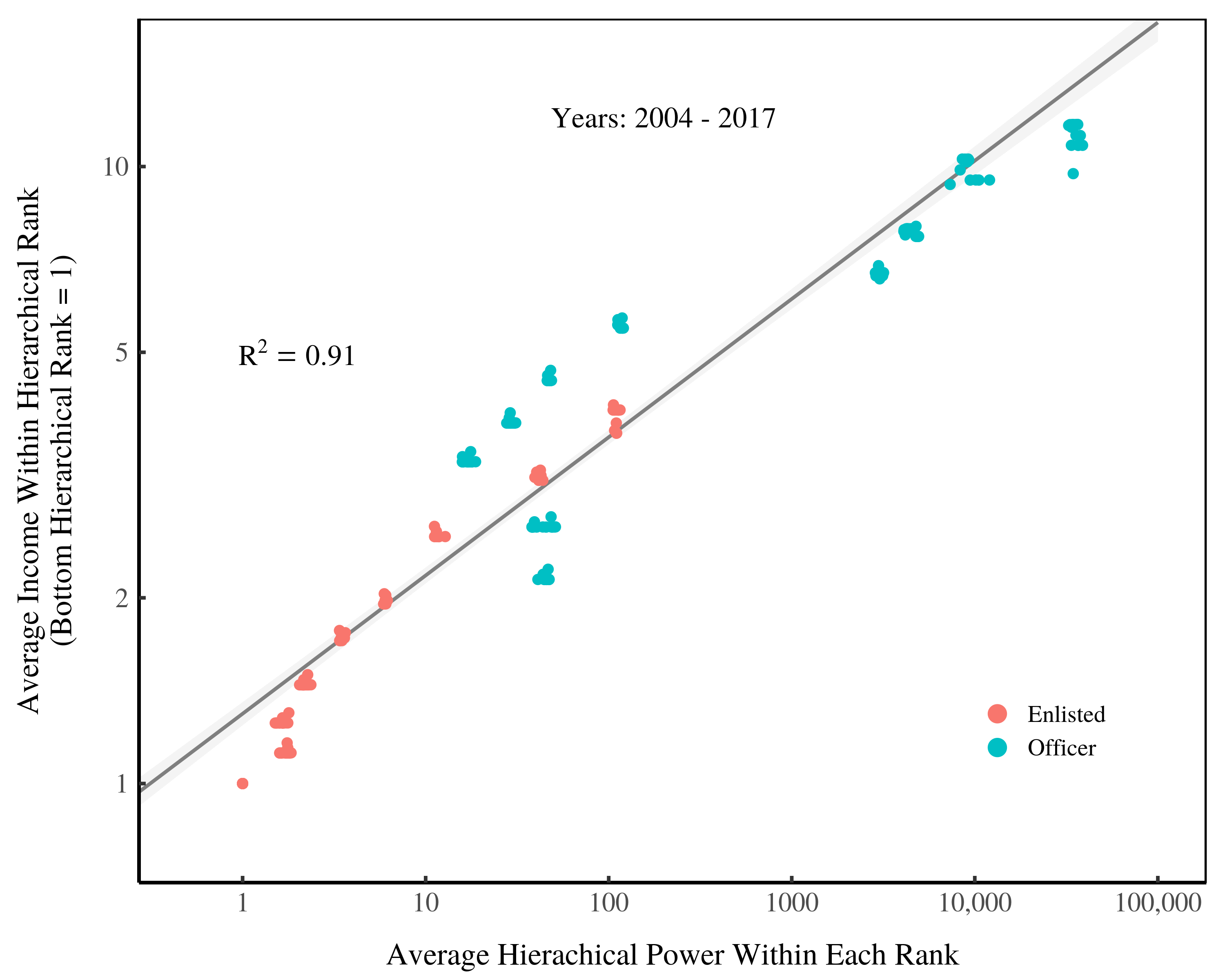
The Power Ethos in the US Military
July 19, 2020
Originally published on Economics from the Top Down
Blair Fix
In How Hierarchy Can Mediate the Returns to Education I examined the pay structure of the US military. I found that hierarchical rank is (by far) the strongest determinant of military pay.
Here I want to show you that there is a regularity to military pay. In the US military, income is proportional to the number of subordinates one controls. I call this return to social influence the ‘power ethos’. It’s something I’ve predicted is a universal feature of hierarchies.
The military hierarchy
Before getting to the power ethos, we’ll look first at the US military hierarchy. Figure 1 shows employment by rank in the US military. To construct the hierarchy, I’ve assumed that officers outrank all enlistees.

Figure 1: Hierarchical structure of the US military. This figure shows military employment by rank. The bar plots show median rank size over the years 2004–2017. Error bars show variation over the same period. I’ve excluded warrant officers from the hierarchy. Data is from annual demographics reports (Demographics: Profile of the Military Community)
As you can see in Figure 1, the US military hierarchy doesn’t have the classic pyramid shape that we expect in a hierarchy. Instead, it’s a bumpy pyramid. This is because there are more low-ranking officers than there are high-ranking enlistees. The caveat here is that I’m constructing the hierarchy from pay grades. While these grades map onto rank, they may not reflect the actual chain of command in the military. Since I don’t have access to chain of command data, I make do with constructing the hierarchy using pay grades.
The power ethos in the US military
The key feature of a hierarchy is that power flows from top to bottom. This means those at the top wield enormous power. To quantify power in a hierarchy, we simply count subordinates. I define hierarchical power as:
hierarchical power = number of subordinates + 1
In hierarchies, I’ve proposed that resources are distributed according to the power ethos: to each according to their social influence. Using hierarchical power as our measure of social influence, it’s straightforward to test for the power ethos in the US military. We simply test if income relates to hierarchical power. Here’s what we find:
 Figure 2: Evidence for the power ethos in the US military. The vertical axis shows average income within each hierarchical rank. The horizontal axis shows average hierarchical power for individuals in each rank. Points indicate a hierarchical rank in a given year. (Warrant officers are excluded from the hierarchy.) I calculate average income within each rank using the midpoint of the experience grid. Data is from annual demographics reports (Demographics: Profile of the Military Community)
Figure 2: Evidence for the power ethos in the US military. The vertical axis shows average income within each hierarchical rank. The horizontal axis shows average hierarchical power for individuals in each rank. Points indicate a hierarchical rank in a given year. (Warrant officers are excluded from the hierarchy.) I calculate average income within each rank using the midpoint of the experience grid. Data is from annual demographics reports (Demographics: Profile of the Military Community)
So even though the US military hierarchy has an unusual shape, the power ethos still seems to prevail. Income is proportional to hierarchical power.
Does hierarchical power cause income?
It’s clear that the power ethos prevails in the US military. But does this mean that hierarchical power causes income?
The first order answer is no, hierarchical power does not cause income. We know this because the US military pay grid (see Figure 1 here) tells us exactly what causes income — rank and experience. Because ‘hierarchical power’ isn’t on the pay grid, it doesn’t cause income.
But beyond this first order cause, we have to ask — what caused the military pay grid? It seems conceivable that higher ranking officers — those with more power — get more say in creating the pay grid. If this is true, then hierarchical power does cause income (albeit indirectly). High-ranking officers use their social influence to gain access to resources.
The bottom line is that there is probably no simple line of causation between hierarchical power and income. There are certainly no natural laws at work. Instead, it seems likely that the power ethos is an emergent property of hierarchies. Just what, exactly, causes the power ethos to occur is an exciting area of research. Join me in studying it!
